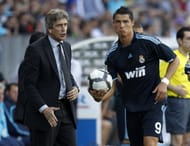Two minutes. A mere two minutes are all that separated Manuel Pellegrini and his newly invigorated Malaga side from the UEFA Champions League semifinals. If Malaga held on, they would be through to the last four which comprised of Real Madrid, Barcelona, and Bayern Munich. Alas, both of those minutes yielded a goal each for a Dortmund team that seemed to have 90,000 players playing for them, instead of the stipulated 11. It was almost natural for people to imagine Pellegrini putting up his hands and saying – ‘Story of my life’.
And you can hardly blame the poor Chilean for that. His whole career’s been a grand amalgam of ‘what ifs’, ‘what could have beens’ and ‘if onlys’. Time is running out for him, since age – something that was always on his side when he was the potent, rising manager of Villareal – has slowly come to betray him, and all he has is a reputation of a time gone by which largely constitutes his impressive resume. And Malaga was touted to be his make-or-break, his do-or-die assignment. Failure with Malaga would certainly have deemed him more mediocre than what history would suggest, and condemn him into the lesser-known realms of European football. He has risen to the task at hand and whipped up a consistent and efficient unit out of Malaga, but, once again, if only…
Pellegrini’s managerial career picked up from where he had left off his playing career – Universidad de Chile. He had one season with them before having a series of short spells at Palestino, alternating between equally brief stints with the Chile U-20 side at O’Higgins, Universidad Catolica, with whom he finished runner-up for two successive seasons in Chile, and leading Ecuadorian club LDU Quito to the domestic title in 1999. He then had a season each with San Lorenzo and River Plate, which did turn out to be quite productive, before landing his big break at Villareal in 2004.
He took Villareal to heights even he wouldn’t have had dreamt of. In his very first season, he guided them to the third place in La Liga, otherwise considered as the first place for teams other than Barca and Real, and also reached the quarter finals of the UEFA Cup. He then took them all the way to the semifinals of the Champions League the following season, booking a dream date with eventual runners-up Arsenal. In the 2007-08 season, Villareal finished above mighty Barcelona in the La Liga table for a club record second place. His deeds with ‘The Yellow Submarines’ were not going unnoticed, and fate was conspiring to bring about the appointment of Pellegrini at Real, and give him the opportunity of directing ‘perhaps the most important club in the world’, as he put it.
It’s said some men are born great, while others have greatness thrust upon them. Most candidates belonging to the latter category tend to choke when the greatness is being forced into their mouths, and sadly Pellegrini wasn’t an exception. His summer signings, though, had people talking about a new ‘Galacticos’ era at the Bernabeu, with the arrival of Kaka from Milan, Benzema from Olympique Lyonnaise, Xabi Alonso from Liverpool, and of course, Cristiano Ronaldo, from Manchester United. He couldnt have asked for more, it seemed.
“If we want to win the Champions League and be the best team in the world, we need the best players in the world.” He got all the best players in the world he had asked for, but leave alone being the best team in the world, even the 96 points that Real garnered in La Liga proved to be insufficient as Barca retained their Spanish title with 99 points. Real was already eliminated from the Copa Del Ray by the second division club Alcorcon, losing 1-4 on aggregate. The biggest jolt came when Real went out of the Champions League as early as the Round of 16, at the hands of Lyon, losing 1-2 on aggregate. With only the league left to play for, Real failed there as well, and before we knew it, ‘The Special One’ was in Pellegrini’s office, making sure his predecessor at the Bernabeu hadn’t left anything behind.
He joined bottom-placed Malaga on the 5th of November, 2010 with a herculean task lying in wait for him. Malaga scraped through and thus began the rebuilding process of a team that eventually finished fourth with 58 points at the end of the 2011-12 season, thus qualifying for the Champions League for the first time in its history. Van Nistelrooy, Rondon and especially Santi Cazorla had vital roles to play in Malaga’s rise, and all three of those players left the club at the end of the season. And yet, here we are, left to rue a quarterfinal defeat that was unfair on Malaga in more ways than one. All we can do at this point is admire Mr. Pellegrini, wish Malaga luck to qualify for the Champions League again, and just think, if only…

